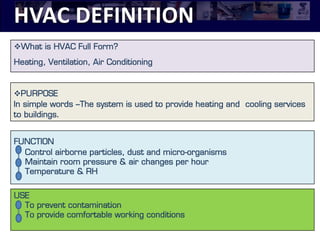HVAC is a term you may have heard before. But what does it mean? HVAC stands for Heating, Ventilation, and Air Conditioning. These systems help control the climate in buildings. They also improve indoor air quality.

Credit: www.slideshare.net
What Does HVAC Mean?
HVAC stands for:
- Heating
- Ventilation
- Air Conditioning
Each part of HVAC plays a special role. Let’s look at each one closely.
Heating
Heating keeps buildings warm in cold weather. It uses different methods like:
- Furnaces
- Boilers
- Heat Pumps
These systems make sure rooms stay cozy and warm.
Ventilation
Ventilation is about moving air in and out of buildings. It helps remove bad air and bring in fresh air. This keeps the air inside clean and healthy. Ventilation systems include:
- Fans
- Air Ducts
- Exhaust Systems
Air Conditioning
Air Conditioning cools down spaces during hot weather. It works by removing heat from the air. This makes rooms feel cool and comfortable. Air conditioning systems use:
- Air Conditioners
- Chillers
- Cooling Towers
Why is HVAC Important?
HVAC systems are important for many reasons. They make sure buildings are comfortable to live and work in. Here are some key reasons:
- Comfort: HVAC systems keep temperatures just right.
- Health: They improve indoor air quality. This can help prevent allergies and sickness.
- Efficiency: Good HVAC systems save energy and money.
How Do HVAC Systems Work?
HVAC systems work together to control temperature and air quality. Here is a simple explanation:
- Thermostat: This device controls the HVAC system. You set the desired temperature here.
- Heating: When it’s cold, the heating system warms the air.
- Cooling: When it’s hot, the cooling system cools the air.
- Ventilation: The ventilation system keeps air moving and fresh.

Credit: www.redbubble.com
Different Types of HVAC Systems
There are different types of HVAC systems. Each type fits different needs. Here are some common types:
Split Systems
Split systems have two main parts: an indoor unit and an outdoor unit. The indoor unit handles the air in the building. The outdoor unit handles the air outside. They work together to control temperature and air quality.
Hybrid Systems
Hybrid systems are like split systems, but they can use different energy sources. This can save energy and money. They switch between electricity and gas for heating and cooling.
Ductless Systems
Ductless systems do not use air ducts. They have an outdoor unit and one or more indoor units. These systems are good for older buildings without ducts.
Packaged Systems
Packaged systems have all parts in one unit. This unit is usually placed on the roof or outside the building. These systems are good for small buildings.
Maintaining Your HVAC System
Maintaining your HVAC system is very important. Regular maintenance keeps it working well. Here are some tips:
- Change air filters regularly.
- Keep vents clean and clear.
- Check for leaks and fix them quickly.
- Schedule professional check-ups twice a year.
Benefits of a Well-Maintained HVAC System
Keeping your HVAC system in good shape has many benefits. Here are a few:
- Efficiency: A well-maintained system uses less energy.
- Longevity: Proper care makes your system last longer.
- Air Quality: Clean systems provide better air quality.
- Cost Savings: Efficient systems save money on energy bills.
Signs Your HVAC System Needs Attention
Sometimes, your HVAC system may need repairs. Here are some signs to watch for:
- Strange noises from the system.
- Unusual smells from vents.
- Rooms not heating or cooling properly.
- Higher energy bills without extra usage.
If you notice these signs, call a professional. They can fix problems and keep your system running well.
Choosing the Right HVAC System
Choosing the right HVAC system is important. Consider these factors:
- Size: Make sure the system fits your building size.
- Efficiency: Look for energy-efficient models.
- Cost: Consider both upfront and long-term costs.
- Climate: Choose a system suited for your local weather.
Frequently Asked Questions
What Does Hvac Stand For?
HVAC stands for Heating, Ventilation, and Air Conditioning.
How Does Hvac Work?
HVAC systems regulate temperature, humidity, and air quality in buildings.
What Are The Components Of Hvac?
The main components are the furnace, air conditioner, ducts, and thermostat.
Why Is Hvac Maintenance Important?
Regular maintenance ensures efficiency, longevity, and reduces repair costs.
Conclusion
HVAC systems are key for comfort and health in buildings. They control temperature and improve air quality. Understanding how they work helps you make smart choices. Maintain your HVAC system well for the best performance. Choose the right system to fit your needs. With good care, your HVAC system will serve you well for years.
